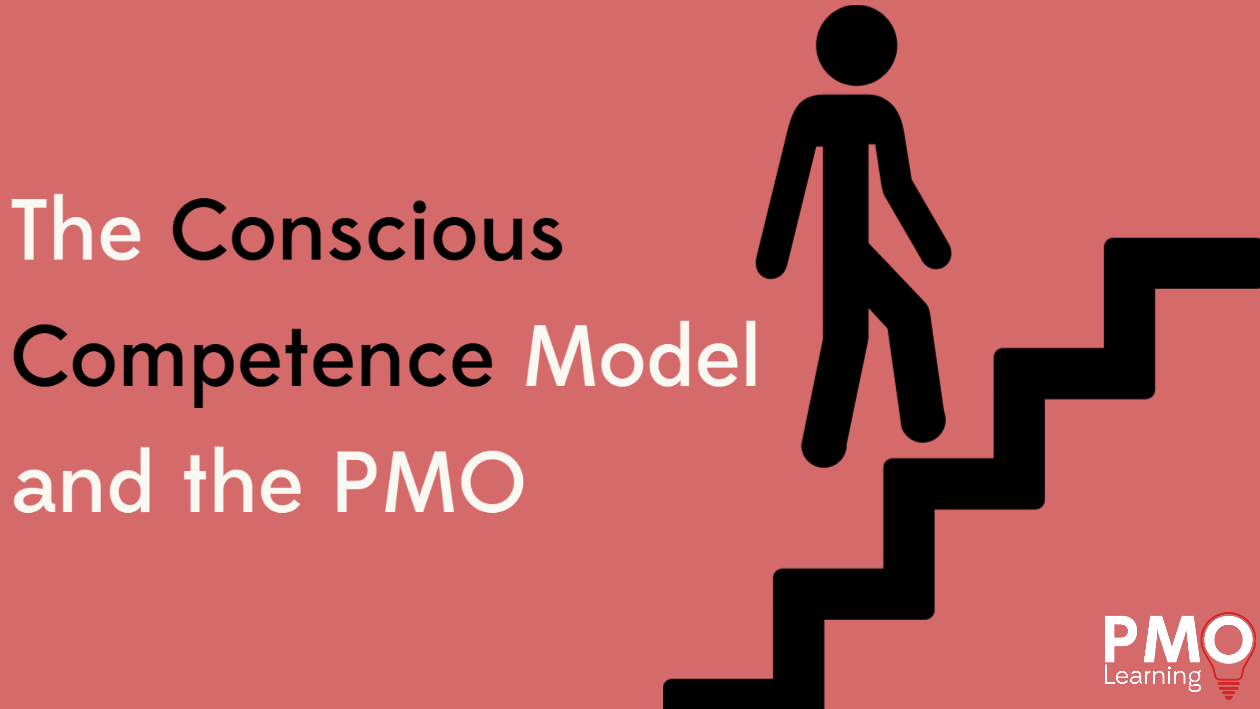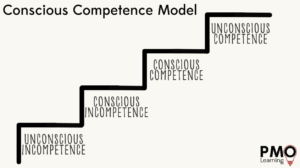Are there some parts of your day to day PMO job that you can do without really thinking about it? How about those areas of the job which you’re still getting to grips with? Or perhaps you are one of those PMO professionals who look forward to the unknown, the challenge of a new task that you’ve never done before – one that gets the brain cells working?
There’s a model in psychology circles called the Conscious Competence Model which is used to describe the processes involved in developing a skill from incompetence to competence. Let’s take a look at the model and how it relates to a PMO professional’s job.
The first ‘step’ of the Conscious Competence Model is ‘Unconscious Incompetence’.
At this stage, you may not be aware of how to do something, and so are not aware of how this lack of knowledge may have a negative impact on the work you’ll be carrying out. You don’t know what you don’t know.
A classic example is asking someone new to the job to complete the risk register. They might have a bash at it but ultimately the end result won’t be right and will need doing again – preferably after some training and guidance.
In order to move onto the next step in the Model, you must first recognise their own incompetence and the value of a new skill and therefore develop an awareness of what it is you don’t know.
The next ‘step’ is referred to as ‘Conscious Incompetence’ which means an individual may not understand how to do something but recognises the value of learning the skill to address the gap they have in their knowledge.
A good example of this is working on someone else’s spreadsheet. You know how to use spreadsheets but not this one and you’re unsure how it works to get the results you need.
This stage can be difficult depending on what it is you’re trying to do and learning, change of behaviours, and making mistakes is integral to the development to the next stage of the Model.
The ‘Conscious Competence’ step is where you understand what needs to be done and you know how to perform the skill. However, in doing so, they have to consciously concentrate in order to demonstrate the skill.
It’s the attention and focus you need to give a task that makes you slower at it than someone who is more skilled.
A good example of this is where you still rely on checklists or notes you’ve taken to perform different parts of a process.
After continued practice, you reach the ‘Unconscious Competence step’. The task or skill becomes second nature and can be performed with ease.
At this stage, you’re also able to mentor others in the task too because you’re highly skilled at it.
Understanding Competence in Your PMO Role
Within the PMO, there are a significant amount of services that may be provided, ranging from change control, finance, reporting, learning and knowledge management, all the way through to quality assurance and beyond. Within each of these services, there is a specific skill set that must be developed in order to deliver that service well.
These skills are all wrapped up with knowledge and behaviours too – the combination is what we need to be competent in our roles.
 How Can I Learn More about Competences within PMO?
How Can I Learn More about Competences within PMO?
The House of PMO, with the help of the PMO Flashmob community, have released The PMO Competency Framework – a guide for PMO professionals interested in assessing and developing organisation-wide, team and personal competences within a PMO environment.
The guidance within the PMO Competency Framework can be used by any PMO professional to assess their current knowledge and experience; to identify skills gaps and development needs and to benchmark themselves against a professional PMO standard, and can help those within the PMO develop from the ‘Unconscious Incompetence’ step all the way through to the ‘Unconscious Competence’ step.
At PMO Learning we can of course help with the skills gaps and development needs when you’ve carried out your own assessment. To get started, order your copy today.
Enjoying Our Blog?
Sign up and receive all our articles (we’ll send you an update once a week!) plus special offers and events:
This post contains affiliate ad links.










